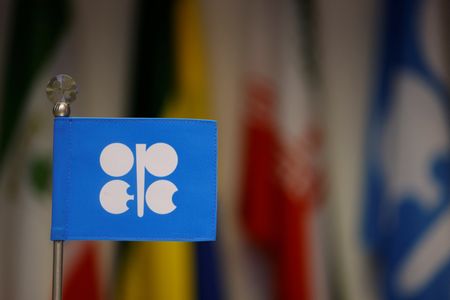 1
1 1
1
LONDON (Reuters) – OPEC and its allies, including Russia, meet in Vienna on June 4 to decide on their output policy.
The group, known as OPEC+, agreed on April 2 to increase crude oil production cuts to 3.66 million barrels per day (bpd) or 3.7% of global demand, after several members pledged unilateral cuts.
The surprise announcement helped to push up prices by about $9 a barrel to above $87 per barrel over the days followed, but Brent prices since lost those gains. [O/R]
Here are the main reasons why OPEC+ cut output:
CONCERNS ABOUT WEAK GLOBAL DEMAND
Saudi Arabia has said voluntary output cuts of 1.66 million bpd on top of the existing 2 million bpd cuts were a precautionary measure to improve market stability.
Russian Deputy Prime Minister Alexander Novak said the Western banking crisis was one of the reasons behind the cut as well as “interference with market dynamics”, a Russian expression to describe a Western price cap on Russian oil.
Fears of another banking crisis in recent months have led investors to sell out of riskier assets such as commodities with oil prices falling to near $75 per barrel from a peak of $139 in March 2022.
A global recession could lead to lower oil prices.
Oil prices have also come under pressure from concerns about the U.S. debt ceiling negotiations and fears of a debt default in the world’s biggest oil consumer.
“A potential default would have catastrophic economic repercussions domestically as well as globally, which would have an adverse impact on oil demand,” PVM Oil’s Tamas Varga said.
PUNISHING SPECULATORS
The cut will also punish oil short sellers or those who bet on oil price declines.
In 2020, Saudi Energy Minister Prince Abdulaziz bin Salman warned traders against betting heavily in the oil market, saying he would try to make the market jumpy and promising that those who gamble on the oil price would be “ouching like hell”.
He repeated his warning last week, telling speculators to “watch out,” which many market watchers and investors interpreted as a signal that OPEC+ could consider further output cuts.
Short sellers are those who position themselves to profit if prices fall, such as by selling borrowed assets in the hope of buying them back more cheaply. If an unexpected OPEC+ production cut causes oil to rally, they face a loss.
Analysts at Standard Chartered bank said in a report last week that short speculative positions in crude oil earlier this month were as bearish as they were at the start of the pandemic in 2020 – when oil demand and prices collapsed.
More recent data showed money managers increased their net-long position in Brent by more than 30,000 contracts, the biggest increase in almost two months, Saxo Bank’s Ole Hansen said.
For WTI, a move in the opposite direction resulted in a 17,000 contract reduction in the net long to 143,000, he added.
TENSIONS WITH WASHINGTON
Any additional cuts from the group could drive tensions with leading consuming nations that are trying to fight inflation by raising borrowing costs.
Washington called OPEC+’s action last month inadvisable.
The West has repeatedly criticised OPEC for manipulating prices and siding with Russia despite the war in Ukraine.
The United States is considering passing legislation known as NOPEC, which would allow the seizure of OPEC’s assets on U.S. territory if market collusion is proved.
OPEC+ has criticised the International Energy Agency, the West’s energy watchdog in which the United States is the biggest financial donor, for releasing oil stocks last year, which it said was necessary to bring down prices given fears sanctions would disrupt Russian supply.
The IEA’s predictions of price strength never materialised, prompting OPEC+ sources to say it was politically driven and designed to help boost U.S. President Joe Biden’s ratings.
The United States, which released most stocks, said it would buy back some oil in 2023, but later ruled it out.
OPEC observers also say the group needs nominal oil prices to be higher because of money printing by the West in recent years has lowered the value of the U.S. dollar. That means OPEC needs to protect its revenues from its main export product, which trades in dollars.
(Reporting by Ahmad Ghaddar and Dmitry Zhdannikov; editing by Barbara Lewis)